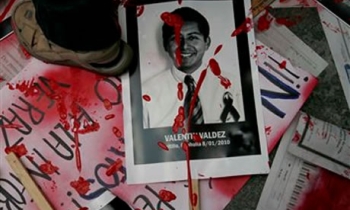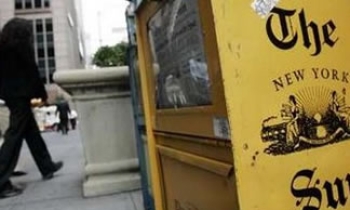TORONTO (Reuters) - Fallen newspaper tycoon Conrad Black has rarely backed away from a fight, locking horns with powerful adversaries including fellow media mogul Rupert Murdoch and former Canadian Prime Minister Jean Chretien.
On Friday he lost perhaps the most important battle of his life when a jury in Chicago found him guilty of multiple counts of criminal fraud, related to allegations that he stole millions from Hollinger International Inc., the former newspaper publishing empire he once controlled.
In the 15-week trial, the verbose Black was described as snotty and arrogant by his own lawyers, who argued that that did not make him guilty.
Prosecutors said Black and his former associates were nothing more than greedy thieves.
"I would think he is in total shock," said Canadian author Peter C. Newman, who wrote the first biography of Black in 1982. "He really did believe he was innocent."
The charges tarnished the former media baron's legacy, bringing him from the corridors of Britain's House of Lords to a courthouse in Chicago.
Black, who once invoked Orson Welles' famous words in Citizen Kane: "People will think what I tell them to think," was forced to watch as investigators combed through his finances, amid allegations that he used company money to fund a lavish high society lifestyle.
The criminal trial was a hard come down for a man who hobnobbed with the likes of Henry Kissinger and turned a small investment in a pair of small Canadian newspapers into what was once the world's third-largest newspaper empire.
His control of flagship titles -- including London's Daily Telegraph, the Chicago Sun-Times and Jerusalem Post -- made him a modern day press baron, with influence and connections that won him an appointment as Lord Black of Crossharbour. In the early 1990s his Telegraph took on Murdoch's Times of London in a circulation war.
Black's hold on the public imagination was just as strong. His colorful personality, bombastic prose and outspoken hard-right political views always ensured him a high profile, particularly in his native Canada.
"Humility is a good quality, but it can be overdone," he told a newspaper in 1994.
Fascinated by the rise and fall of great historical figures, Black wrote a massive biography of Franklin Roosevelt that was published to critical acclaim in 2003, just as his fortunes and prestige began their steep decline.
His biography of former U.S. president Richard Nixon was published during his trial this year.
The once verbose mogul fell uncharacteristically silent as the case progressed, rarely offering more than a short sound bite as he went in and out of court.
But he retained his combative streak.
Leaving court at one point, he told a Canadian French language reporter that the case against him was "pure fiction."
The Montreal-born Black, 62, is the silver-spoon scion of a wealthy family who was kicked out of Canada's most exclusive boys' college for stealing and selling examination papers. He later went on to receive a law degree and an MA in history.
His first investment -- at the tender age of eight -- was a $59 share in General Motors, which he never sold.
His newspaper empire began with the C$500 purchase of a half-interest in two Quebec weeklies in 1967. Black founded his first newspaper group when he was 27 before becoming chairman of Canadian conglomerate Argus Corp. in 1978. He spun out Hollinger and used it in 1985 to buy the Telegraph, a leading British conservative newspaper.
By the 1990s Black's companies owned hundreds of newspapers, including Canada's Southam group, which he sold off in 2000 for C$3.2 billion.
In 1999, the Canadian government, led by Chretien, blocked Black's appointment to Britain's House of Lords using a little known parliamentary resolution from 1919 which prevents Canadians from accepting foreign titles.
Black responded by launching an unsuccessful lawsuit against Chretien and then renouncing his Canadian citizenship. He received his peerage in 2001. Last year, he said he would file to regain his Canadian citizenship.
"This is a tragedy," Newman said on Black's conviction. "He really did have a great brain and a great memory, and it's a tragedy for us as well as for him that he didn't live up to his potential and will end up in an American jail."









